63% expect climate impacts to worsen in their lifetime
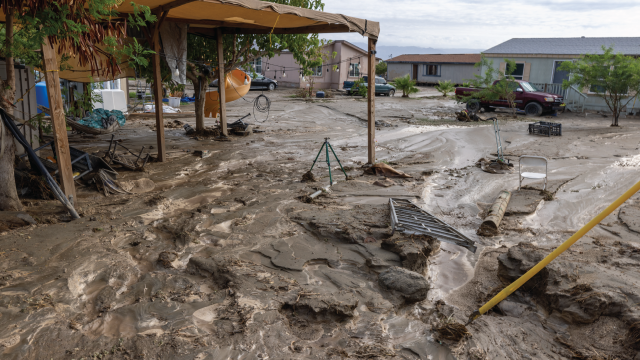
Pew Research Center conducted this study to understand Americans’ views of climate change and its impact on the country. For this analysis, we surveyed 8,842 U.S. adults from Sept. 25 to Oct. 1, 2023.
Everyone who took part in the survey is a member of the Center’s American Trends Panel (ATP), an online survey panel that is recruited through national, random sampling of residential addresses. This way, nearly all U.S. adults have a chance of selection. The survey is weighted to be representative of the U.S. adult population by gender, race, ethnicity, partisan affiliation, education and other categories. Read more about the ATP’s methodology.
Here are the questions used for this report, along with responses, and its methodology.
A new Pew Research Center survey finds a majority of Americans think climate change is causing harm to people in the United States today and 63% expect things to get worse in their lifetime.
When it comes to the personal impact of climate change, most Americans think they’ll have to make at least minor sacrifices over their lifetime because of climate change, but a relatively modest share think climate impacts will require them to make major sacrifices in their own lives.
July 2023 was hotter than any other month in the global temperature record, and the United Nations climate panel has warned of growing impacts from climate change barring major reductions in greenhouse gas emissions worldwide.
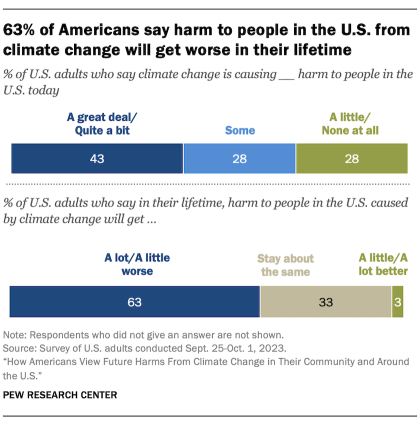
The Center survey of 8,842 U.S. adults conducted Sept. 25-Oct. 1, 2023, finds that 43% of Americans think climate change is causing a great deal or quite a bit of harm to people in the U.S. today. An additional 28% say it is causing some harm.
Looking ahead, young adults ages 18 to 29 are especially likely to foresee worsening climate impacts: 78% think harm to people in the U.S. caused by climate change will get a little or a lot worse in their lifetime.
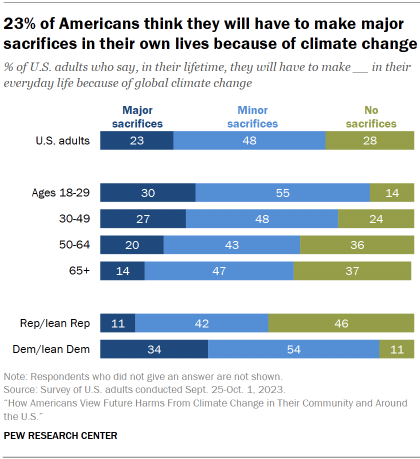
About a quarter of Americans (23%) think they’ll have to make major sacrifices in their everyday lives because of climate change. A larger share (48%) expects to make minor sacrifices because of climate impacts and 28% of Americans expect to make no sacrifices at all.
Republicans and Democrats have much different expectations for how climate change will impact their lives. Just under half of all Republicans and Republican-leaning independents expect to make no sacrifices in their everyday lives because of climate change. By comparison, 88% of Democrats and Democratic-leaning independents expect to have to make at least minor sacrifices.
These partisan gaps are closely tied to differing expectations about national impacts: 86% of Democrats expect harms from climate change in the U.S. to get worse during their lifetime; just 37% of Republicans say the same.
More broadly, the public believes individual Americans can make less of a difference on climate change than other major actors. For example, 55% think the energy industry can do a lot to reduce the effects of climate change and 52% say this about large businesses and corporations. By comparison, far fewer (27%) say individual Americans can do a lot to reduce climate impacts.
Climate change consistently ranks lower than other national issues like the economy, health care and crime on the public’s list of national priorities for the president and Congress. Nonetheless, 74% say the U.S. should participate in international efforts to address the issue and majorities support a number of specific policies intended to reduce the effects of climate change, such as providing a tax credits to businesses for developing carbon capture and storage technologies.
Views on climate activism
Despite widespread concern about future climate impacts there has been a slight decline in participation in forms of climate activism. The survey finds 21% of of U.S. adults say they have participated in at least one of four climate-related activities in the last year, including donating money to a climate organization or attending a climate protest. This is down slightly from two years ago when 24% of Americans said they had participated in a climate-related activity.
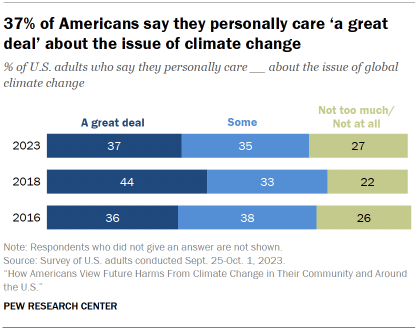
Furthermore, Americans are largely skeptical that climate activism builds public support for the issue or spurs elected officials to act. Just 28% think climate activism makes people more likely to support action on climate change and only 11% say it is extremely or very effective at getting elected officials to act on the issue. For more, read Chapter 3 of the report, “Climate activism.”
Consistent with the slight decline in levels of climate activism, there has been no increase in personal concern on the issue in recent years. Overall, 37% say they personally care a great deal about the issue of climate change. This share is down 7 percentage points from 2018 and about the same as it was in 2016, the first time the Center asked the question.
How Americans view the expertise of climate scientists
A related analysis finds only about one-third of Americans think climate scientists understand “very well” whether climate change is happening. An even smaller share says climate scientists understand the causes of climate change very well.
For more, read “Americans continue to have doubts about climate scientists’ understanding of climate change.”
The survey findings are organized into three chapters exploring the following topics in more detail:
- Expectations for future climate change impacts
- What groups Americans think can make a difference on climate change
- Climate activism and engagement
Public expectations of future climate impacts locally and around the U.S.
Experts predict that some regions of the U.S. will face more severe climate impacts than others. Americans also make distinctions when asked to think about future climate impacts on some different places around the country.
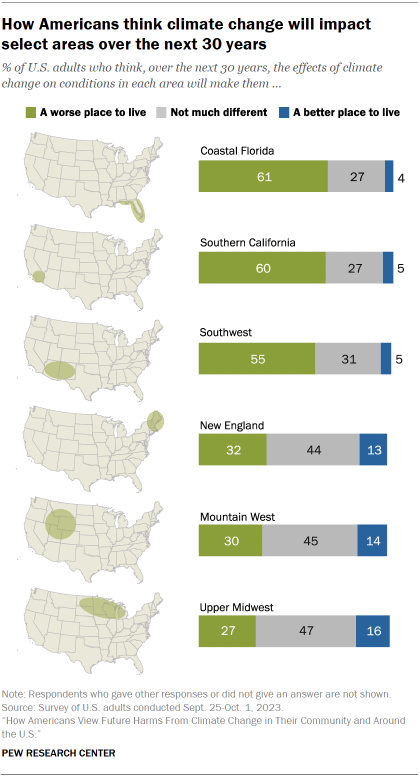
Majorities expect that coastal Florida (61%), Southern California (60%) and the Southwest (55%) will become worse places to live over the next 30 years because of the effects of climate change.
Assessments of other areas are less negative. Only around three-in-ten think New England (32%) and the Mountain West (30%) will become worse places to live over the next 30 years because of climate change; 27% say this about the Upper Midwest.
Americans’ assessments of the impact of climate change on their own communities tilt more negative than positive, though a sizable share do not expect much change. Overall, 41% think their own community will become a worse place to live over the next 30 years due to the effects of climate change. Just 7% think climate impacts will make conditions in their community better, while 41% think climate impacts won’t change conditions in their area much.
Democrats (59%), young adults (56%) and Americans living in the Western region of the country (51%) are among the groups most likely to believe conditions in their community will become worse in the next 30 years because of climate change. Read more about these differences in Chapter 1.
Emotional reactions to climate news and information
Seven-in-ten Americans say they’ve felt sad about what is happening to the Earth, when they’ve seen news and information about climate change recently. Half say they’ve felt motivated to do more to address the issue when they saw climate news and information recently.
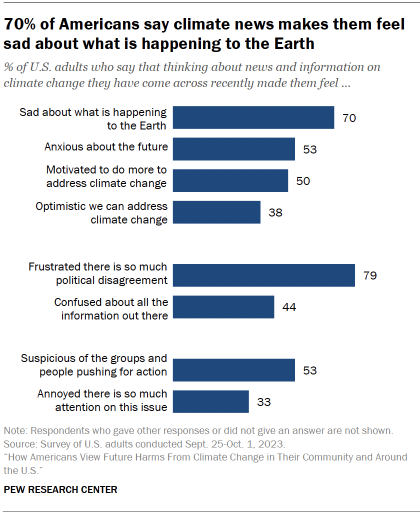
A sense of optimism about progress is not widely held: 38% say they’ve felt optimistic we can address climate change when they’ve seen news and information on the topic. A June 2023 Center survey found just 33% of Americans think the U.S. and other countries around the world will do enough to avoid the worst impacts of climate change.
Americans’ most common emotional reaction to climate news is feeling frustrated that there is so much political disagreement on the issue; 79% say they’ve felt this way recently.
A sense of skepticism toward climate advocates also registers with a sizable share of the public: 53% of Americans say they’ve felt suspicious of the groups and people pushing for action on climate change when they’ve seen climate news and information recently. An August Pew Research Center study used qualitative interviews to explore the views of those who do not see urgency on climate change; the analysis found that crisis language on climate change often drove suspicion and deeper mistrust among participants who see climate change as a lower-tier priority.
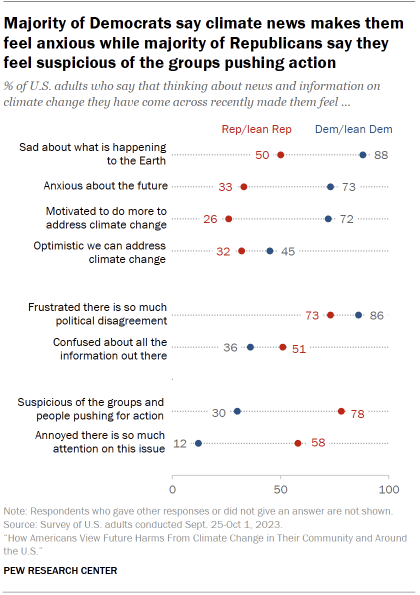
Republicans and Democrats have starkly different emotional responses to news and information on climate change.
Among Democrats and Democratic leaners:
- 88% say they felt sad about what is happening to the Earth.
- 73% felt anxious about the future.
- 72% felt motivated to do more to address the issue.
Still, fewer than half of Democats (45%) say they felt optimistic about addressing the issue when they’ve seen climate news and information recently.
Among Republicans and Republican leaners:
- 78% felt suspicious of the groups and people pushing for action on climate change.
- 58% felt annoyed there is so much attention on the issue of climate change.
- 51% felt confused about all the information out there about climate change.
Despite broad skepticism within the GOP toward groups pushing action on climate change, half of Republicans say they felt sad about what is happening to the Earth when they recently came across climate news and information.
One sentiment that registers with large shares of Republican and Democrats alike is frustration that there is so much political disagreement over climate change: 86% of Democrats and 73% of Republicans express this feeling.


